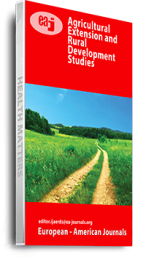Nigeria is one of the leading cocoa producing countries in West Africa. However, since the discovery of crude oil there has been a decline in cocoa production which resulted in Nigeria losing its leading position as the foremost cocoa exporter to Cote d’Ivoire and Ghana. To revitalize the cocoa production in Nigeria series of efforts are put in place including training of farmers on improved Cultural Management Practices (CMP). This study therefore compared cocoa farmers’ knowledge and attitude to trainings on good cultural management practices in Ogun and Ondo States, Nigeria. Multi-stage sampling techniques were used to select 320 cocoa farmers in the study areas. Data obtained were analysed with both descriptive and inferential statistics. Result of the study showed that the mean age of the respondents was 52.8 years with 83.4% of the respondents married and 75.9% of the respondents had primary education. Most (82.8%) of the respondents were male while few (17.2%) were female in cocoa production. Most (83.40%) of the respondents harvested about 10kg/ha from their cocoa farms. The average income generated from cocoa was ₦44,237/kg. Cocoa farmers always got information from Cocoa Certification Agencies (59.4%), cocoa farmers association (54.4%) and radio/television (50.9%). Most (92.5%) of the respondents had wealth of knowledge in selecting suitable site for cocoa production and minimum tillage practices (98.4%). The result further revealed that majority (65.3%) of the respondents strongly agreed that they would spend more money to participate in future CMP trainings and that the training is beneficial (84.1%) hence, satisfied with it (86.2%). All the respondents affirmed that CMP training is an eye opener to a better cocoa farming practices (100%). Also, almost all the respondents (99.4%) reported that they select suitable land for cocoa production, construct nursery bed, select improved seeds variety, and slash weeds underneath cocoa trees. Above ninety percent of cocoa farmers apply fertilizer at rate of 375kg/ha, spray prescribed insecticides and fungicides, and harvest ripe cocoa pods with sharp cutlasses. Major constraints to cocoa production and CMP in the study areas are poor feeder roads (100%), irregular supply of agro-inputs (90.0%), and instability in government policy (88.4%). Result of linear regression showed a significant relationship between socio-economic and cultural management practices at p < 0.05 level of significance. However, result of the t-test analysis indicated that significant difference did not exist in the cocoa cultural management practices in Ogun and Ondo States (t = 2.42, p = 0.06). The study concludes that majority of the cocoa farmers carried out Cultural Management Practices to obtain good yield, and has positive attitude towards CMP trainings as it is highly beneficial to their cocoa farming.
Keywords: Cocoa, Cultural Management Practices, Farmers, Knowledge, Trainings, attitude

